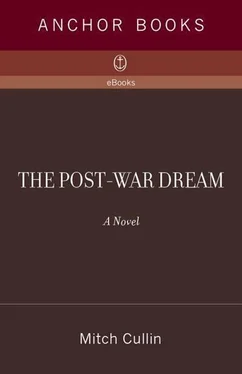“Here, pal, take this,” a limping infantryman said, pausing long enough to fix a brown-eyed gaze on Hollis while pressing a fresh pack of Chesterfields against his palm. “I'm finished,” he explained, moving on toward the train, his uniform dusty and frayed at the collar, his black hair matted and unwashed. “I've quit,” he said, without glancing back. “I'm done.” Tightening his grip on the pack, Hollis watched the infantryman recede, gradually losing sight of him amid the crowd readying for the return journey.
In hindsight, Hollis couldn't remember exactly when it was he began smoking (definitely not while stationed in Japan, undoubtedly after arriving in Korea), but he would never forget the morning he quit — just a couple of weeks later while dug in at the Naktong River, on his last day at the front. Nevertheless, he always associated that encounter with the infantryman as the beginning of an earnest, short-lived nicotine habit, soon hoarding his C-ration cigarettes at the bivouac near P'ohang, treasuring the packs where previously he had given them away. Moreover, there was smoke hanging in his memory, plenty of it — gray-white smoke sucked deep into his chest, regurgitated through his mouth and nose — as prevalent to his recollections as the grit which swirled about the cavalrymen, irritating their eyes, sneaking down the muzzles of their M1s.
Mixing with the summer heat, dust and cigarette smoke reigned behind the Yongdong lines, saturating the regimental command post, drifting above the 2nd Battalion while they took positions and established security posts; it wafted, too, beneath the moonlight when a patrol flank spotted the figures of northern refugees approaching, the white-clad shapes emerging like ghosts on a darkened road: the rumors of enemy infiltrators hiding among the civilians was enough to prompt fire from the jittery patrol flank, the rounds missing the refugees but successful in stopping the advance — the panicked villagers about-facing with heavy loads on their backs, reversing with their children or babies, scrambling backward into the night. And, in turn, it was to be the lighting of a cigarette which brought the regiment's first casualty, the fatal shots ringing through blackness and hitting a lieutenant when he struck a match before dawn, discharged from the semiautomatics of his own men (nervous Easy Company soldiers, inexperienced riflemen who jumped quickly at every sound).
Sometimes in the smoke-laden mornings, McCreedy's pennies were shown again to the jittery men who had returned from night patrol, those disquieted soldiers who sat tiredly beside one another, thoughtlessly nursing their cigarettes, saying very little while McCreedy tried bolstering their spirits by grinning his usual grin, smiling as if he possessed the answers to every problem: the pennies were stacked on his right elbow, balancing there until — with a deft movement of his arm — they fell away from his skin, floating for a millisecond, only to be caught by the swift-grabbing fingers of his right hand. Hollis had seen the coin tricks at least two dozen times; he had seen McCreedy's pennies rolled along gyrating knuckles, disappearing in fists, materializing soon thereafter like two round holes on someone else's forehead. Hollis had also heard more than once the usual spiel which marked the conclusion of McCreedy's display, memorizing the harangue in spite of wanting to forget it.
“I think some of you could use a dose of perspective,” McCreedy always began, holding out a bulging prophylactic, the condom stuffed with pennies and dangling beneath his grip like a half-full water balloon. “Do yourself a favor and have a look at this here. This baby is pretty special, let me tell you. What I keep in here is my Indian Head cents, five percent zinc, ninety-five percent copper, minted by our own U.S. Treasury. This whole bunch was collected together by my grandpa. Seems kind of worthless, I guess, except they don't do these no more. Now, what sets this particular batch apart is every last one hails from the exact same year — that'd be 1876, and that'd also be the same year General Custer took that unfortunate tumble at Little Bighorn.” He pulled a single cent from the condom, pinching it between a thumb and forefinger, turning the coin in the sunlight so that the front engraving, a Native American in a feathered headdress, and the reverse side, a circular wreath bound by three arrows, could be glimpsed. “So take a good look at it,” he said, handing the penny to whoever was closest to him. “Have at it, go ahead, pass it on around, would you?”
The significance wasn't lost on any of the cavalrymen, nor did anyone appear dismayed while McCreedy went on to remind them that they were now the military descendants of a singular legacy: they belonged, after all, to the 7th Cavalry; they were also soldiers of the Garryowen regiment, named so after the Gaelic drinking song chosen by the 7th Cavalry's infamous lieutenant colonel — George Armstrong Custer — and still whistled or played on occasion by cavalrymen. As fresh recruits back in the States, they had each been given a pamphlet which glorified the 7th Cavalry's history as formidable Indian fighters, the cover adorned with a horseshoe-and-saber shield; their orientation had also included screenings of They Died with Their Boots On , in which Errol Flynn portrayed the fated commander, the film depicting the Battle of Little Bighorn and the massacre of Custer and his troops by Sioux Indians.
“Just don't ever lose sight of that,” McCreedy said, his voice taking on a serious, melodramatic tone. “When you're feeling low or unsure of what's going on in this godforsaken country, you just remember you belong to the great Seventh Cavalry, and your role, like them what served ahead of us, is to clean the land of ignorant hostiles and pave the way to a better world. It's a true calling, I believe. It's our chance to settle an old score on behalf of those two hundred brave brothers that lost their lives to the savages at Little Bighorn.”
However, it was apparent very few of the men, aside from Schubert Tang, actually had much regard for McCreedy (how they rolled their eyes or shook their heads behind his back, making fun of his pennies and loud, annoying big talk whenever he wasn't around), although he was tolerated out of necessity and, to a greater degree, because he was the single most intimidating, unpredictable one among them. Even so, it amazed Hollis that soft-spoken, introverted Schubert had — since coming off the transport ship onto Korean soil — followed McCreedy like a devoted puppy, and, as a result, was offered a fair amount of kindness and respect, in spite of Schubert belonging to what McCreedy called the Mud Races.
The unlikely bond formed by the two happened early on at the bivouac near P'ohang, when four soldiers from another company gathered around Schubert as he walked alone to the mess tent, taunting him for being a gook, asking him what the hell gave him the nerve to join a white man's army. It was the sudden arrival of McCreedy — putting himself between Schubert and the soldiers, towering over all of them — who shut the foursome up with an extended, jabbing index finger, explaining he would thrash anyone who dared suggest that someone born and raised in the United States of America was a gook, especially if that someone was of Chink descent and was still willing to risk his life against the communist threat perpetuated by his own genetic background. The soldiers found themselves lacking the collective or individual wherewithal to respond, and thinking better of further provoking the wild-eyed Texan by uttering another word, they slinked sheepishly away like bullied children. From then on, Schubert and McCreedy were almost inseparable, eating together, playing cards together, swapping stories, loaning each other cigarettes or matches: the outspoken bigot and the only Asian in the group had become the best of friends. So however Hollis wanted to feel about McCreedy, there now appeared in his inward sight the image of a man at once brave and impossible to gauge.
Читать дальше










![Theresa Cheung - The Dream Dictionary from A to Z [Revised edition] - The Ultimate A–Z to Interpret the Secrets of Your Dreams](/books/692092/theresa-cheung-the-dream-dictionary-from-a-to-z-r-thumb.webp)

